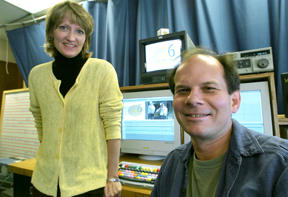Even as news of a new studio was announced Monday, Bainbridge Island Broadcasting’s on-air look was already undergoing considerable change.
Last week, AT&T stopped running its slate of community advertisements, making Channel 6 available to BIB around the clock.
For the time being, the amount of programming won’t change perceptibly, but the times will be more convenient, Executive Director Wendy Johnson said.
“Under the old arrangement, we could not broadcast between 5 and 8 p.m., but now we will have those hours available,” she said.
The amount of different programming BIB can run is limited by the capacity of the automatic tape deck, she said.
Currently, there are six different tape machines, meaning no more than six programs can be in the rotation.
BIB hopes to expand its programming by turning loose volunteers on projects of their own, using new equipment purchased through a one-time city council capital appropriation of $75,000 and the expertise of technical director Scott Schmidt.
“The arts community has been particularly receptive,” Johnson said. “We have a proposal for a program called Bainbridge Backstage, which is conversations with island poets.
“We have a weekly or monthly theater program proposed. Someone else has suggested a cooking show, which will really be conversations with interesting people in a kitchen.”
Much of the equipment, particularly for training, has come from AT&T, which has simply donated gear that it considers surplus.
“AT&T has been great to work with,” Johnson said. “They really understand the value of community television, and have experience working with them.”
The other immediate challenge facing BIB is to secure operational funding. It will request roughly $60,000 per year from the city – some 60 percent of the franchise tax the city charges AT&T – but it needs to generate a similar amount on its own.
City council finance committee chair Bill Knobloch said BIB will have to make its case during the upcoming budget hearings.
“We became comfortable with their business plan, but there are still issues that have to be considered, like governance,” he said.
Johnson said BIB welcomes a partnership with the city, noting that community-access stations like BIB represent three principal constituencies – the public, educational institutions and local government.
“We would like to have city and school district representatives on our board of directors,” she said. “They are critical stakeholders. We want them not to be looking at us as a separate entity.”


